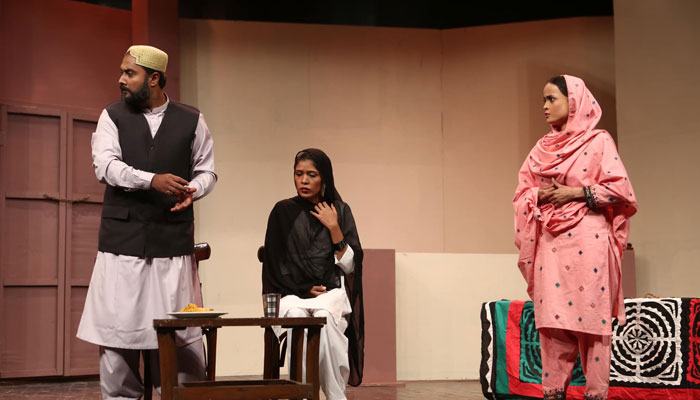Chaturaee — A tragic tale of polygamy wrapped in comedy
The play ‘Chaturaee’, performed on Tuesday at the Arts Council of Pakistan as part of the World Culture Festival, elicited laughter every so often, yet it fundamentally conveyed a tragic tale, masterfully crafted by its writer and director, Shahnawaz Bhatti, under the guise of comedy.
Firstly, it was a delightful experience to witness a realism-based play at the festival, as many of the offerings tended to fall within non-realistic genres such as monologues, absurdist plays and slapstick comedies.
The central theme of polygamy is introduced in the very first scene, in which the two wives of a feudal lord, referred to as Sayeen (sir) throughout the play, are seen bickering. It is later revealed that the feudal lord is also a spiritual leader, holding a Gaddi that essentially belongs to his first wife through her father’s lineage.
He apparently married his first wife, Maryam, who is older than him, out of greed. As the couple could not conceive, he bribed a Mureed of his and married his young, beautiful daughter, Gulabo, who now dominates the household.
The play begins three years after the man’s second marriage. Although the second wife is yet to bear him a child, she remains his favourite, having beguiled him with her beauty. The first wife, largely neglected, attempts to win her husband’s affection but is outmatched by the cunning tactics employed by the second wife.
However, it does not take long for the second wife, so far referred to as Chhoti Sayen (younger madam), to become Manjhli Sayen (middle madam), as Sayeen marries for a third time, claiming that his first two wives have failed to produce an heir to inherit his Gaddi.
The arrival of the third wife, who may not even have reached the legal age for marriage, leads to anagnorisis, as the second wife realises how wicked she had been, not only towards her Sautan (co-wife) but also towards her former fiancé, whom she had abandoned out of greed.
Gulabo then declares that not only are men like Sayeen responsible for the exploitation of women like Maryam but women like her are equally culpable for the suffering of their fellow women, as they willingly marry already-married men for selfish reasons.
A camaraderie develops between Maryam and Gulabo following Sayeen’s third marriage. Initially, Maryam reacts strongly and confronts her husband, who himself is most likely infertile, for marrying an innocent child. However, her anger soon dissipates, and she returns to her subservient role, advising Gulabo to demonstrate Sabr (patience).
Gulabo, however, has other plans. Through an extramarital affair, subtly depicted without explicit mention, she becomes pregnant in an attempt to regain her husband’s favour. The play concludes with Sayeen celebrating Gulabo’s pregnancy.
The entire cast delivered commendable performances. Kainat, who portrayed Maryam, and Yasmeen Usman, who played Gulabo, had the most dialogues and were outstanding. Sarfaraz Ali, as Sayeen, Iqra, in the role of the maid, and Aqsa, as the third wife, also performed admirably.
Not a single line was delivered hastily or quietly, ensuring clear audibility — a significant achievement, considering all the actors are students or recent graduates of the National Academy of Performing Arts. Later, speaking to The News, the play’s writer and director, Shahnawaz Bhatti, explained that ‘Chaturaee’ is a Sindhi word that denotes both cunningness as well as wisdom.
-
 Travis Kelce Plays Key Role In Taylor Swift's 'Opalite' Remix
Travis Kelce Plays Key Role In Taylor Swift's 'Opalite' Remix -
 How Jennifer Aniston's 57th Birthday Went With Boyfriend Jim Curtis
How Jennifer Aniston's 57th Birthday Went With Boyfriend Jim Curtis -
 JoJo Siwa Shares Inspiring Words With Young Changemakers
JoJo Siwa Shares Inspiring Words With Young Changemakers -
 James Van Der Beek Loved Ones Breaks Silence After Fundraiser Hits $2.2M
James Van Der Beek Loved Ones Breaks Silence After Fundraiser Hits $2.2M -
 Disney’s $336m 'Snow White' Remake Ends With $170m Box Office Loss: Report
Disney’s $336m 'Snow White' Remake Ends With $170m Box Office Loss: Report -
 Travis Kelce's Mom Donna Kelce Breaks Silence On His Retirement Plans
Travis Kelce's Mom Donna Kelce Breaks Silence On His Retirement Plans -
 Premiere Date Of 'Spider-Noir' Featuring Nicolas Cage Announced
Premiere Date Of 'Spider-Noir' Featuring Nicolas Cage Announced -
 Pedro Pascal's Sister Reveals His Reaction To Her 'The Beauty' Role
Pedro Pascal's Sister Reveals His Reaction To Her 'The Beauty' Role -
 Kate Middleton Proves She's True 'children's Princess' With THIS Move
Kate Middleton Proves She's True 'children's Princess' With THIS Move -
 Paul Anka Reveals How He Raised Son Ethan Differently From His Daughters
Paul Anka Reveals How He Raised Son Ethan Differently From His Daughters -
 'A Very Special Visitor' Meets Queen Camilla At Clarence House
'A Very Special Visitor' Meets Queen Camilla At Clarence House -
 Jodie Turner Smith Shares One Strict Rule She Follows As A Mom
Jodie Turner Smith Shares One Strict Rule She Follows As A Mom -
 Hailey Bieber Reveals KEY To Balancing Motherhood With Career
Hailey Bieber Reveals KEY To Balancing Motherhood With Career -
 Photo Of Jay-Z, Other Prominent Figures With Jeffrey Epstein Proven To Be Fake
Photo Of Jay-Z, Other Prominent Figures With Jeffrey Epstein Proven To Be Fake -
 Hillary Clinton's Munich Train Video Sparks Conspiracy Theories
Hillary Clinton's Munich Train Video Sparks Conspiracy Theories -
 Fans Slam Talk Show Host For 'cringe' Behavior In Chris Hemsworth Interview
Fans Slam Talk Show Host For 'cringe' Behavior In Chris Hemsworth Interview




